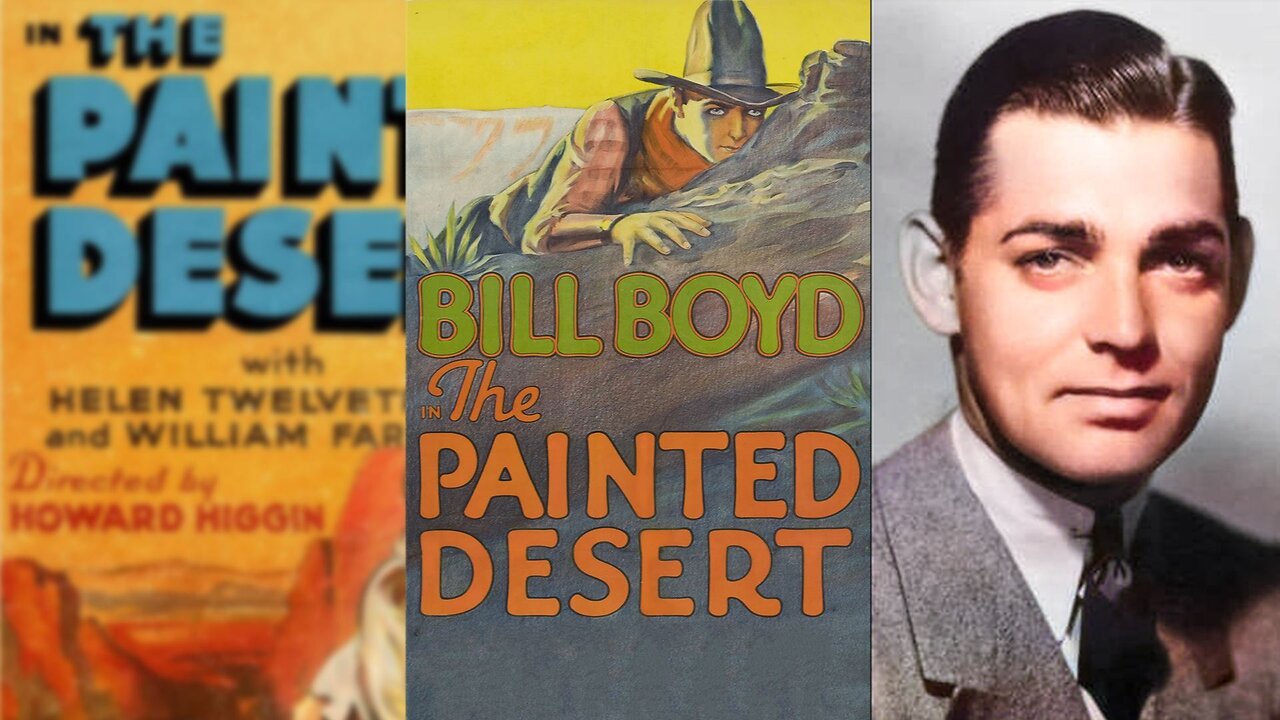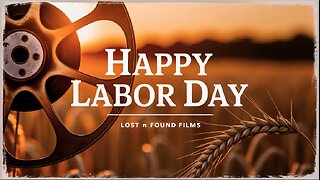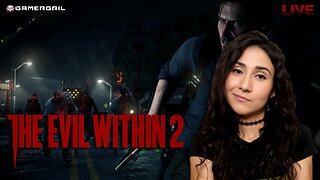Premium Only Content

THE PAINTED DESERT (1931) William Boyd, Helen Twelvetrees & Clark Gable | Western | B&W
Facebook: https://www.facebook.com/smlifdnuofntsol?mibextid=ZbWKwL
TikTok: https://www.tiktok.com/@smlifdnuofntsol?t=8c8cvMnZpBK&_r=1
Instagram: Lost n Found Films
Website: www.lostnfoundfilms.com
The Painted Desert is a 1931 American pre-Code Western film released by Pathé Exchange. Produced by E. B. Derr, it was directed by Howard Higgin, who also co-wrote the screenplay with Tom Buckingham. The picture stars low-budget Western stars William Boyd (in his pre-Hopalong Cassidy era) and Helen Twelvetrees, and most notably features an unshaven young Clark Gable in his talking film debut. The film was shot mostly on location in Arizona.
SYNOPSIS
Two men find an abandoned baby and fight over the ownership of the child resulting in lifelong rivalry.
Two cowboy friends, Jeff (J. Farrell MacDonald) and Cash (William Farnum), are traveling through the desert in the southwest U.S., when they come upon a baby who has been abandoned in the back of a covered wagon. They can't leave the defenseless child, so decide to take the baby with them, however, they argue over which of them would be better suited to raising the child. When Cash ends up prevailing in the debate, this creates a lifelong rift between the two friends.
Years later the baby has now grown into a young man, Bill Holbrook (William Boyd), who works with his adoptive father on their cattle ranch. Cash's erstwhile friend, Jeff, has remained in the area where the infant was found and has established his own ranch, centered on the water hole where the entire feud originally began, a feud which is still in full force. Jeff lives with his grown daughter, Mary Ellen (Helen Twelvetrees). The feud escalates when Cash wants to use the water hole on Jeff's property to water his cattle. Jeff is ready to confront Cash in a stand-off, preventing him from watering his cattle on the property Jeff has claimed, assisted by an itinerant cowboy, Rance Brett (Clark Gable), who has been smitten with Mary Ellen's beauty. The confrontation is temporarily avoided when Cash's herd unexpectedly stampedes.
When Bill discovers tungsten on Jeff's property, he attempts to use it to close the division between his father and Jeff, however this only results in his father kicking him out. He turns to Jeff, and begins a mining operation, which actually has the opposite effect of Bill's original intention, only exacerbating the tension between Jeff and Cash. Bill and Jeff's partnership also causes tension with Rance, since Mary Ellen now shows an interest in Bill. After a shipment of tungsten which was on its way to pay the loan they had taken out to develop the mine is waylaid, Bill works furiously with the miners to replace it with another load. He is successful. However, as he is celebrating the success of the mine, as well as his impending nuptials with Mary Ellen, the mine is sabotaged by a series of explosions.
Everyone believes the mine sabotage is the work of Cash, but it turns out to have been an act of jealousy on the part of Rance, who confesses, leaving the two old friends to reconcile, and their two children to marry.
CAST & CREW
William Boyd as Bill Holbrook [credited as Bill Boyd]
Helen Twelvetrees as Mary Ellen Cameron
William Farnum as Bill 'Cash' Holbrook
J. Farrell MacDonald as Jeff Cameron
Clark Gable as Rance Brett
Charles Sellon as Tonopah
Hugh Adams as 'Dynamite'
Wade Boteler as Bob Carson – Ore Wagon #1 Driver
Will Walling as Kirby
Edmund Breese as Judge Matthews
Guy Edward Hearn as Tex
William LeMaire as Denver
Richard Cramer as Provney
Directed by Howard Higgin, Bert Gilroy
Written by Tom Buckingham, Howard Higgin
Produced by E. B. Derr
Cinematography Edward Snyder
Edited by Clarence Kolster
Music by Francis Gromon
Production company Pathé Exchange
Distributed by RKO Radio Pictures
Release date January 18, 1931 (US)
Running time 85 minutes
Country United States
Language English
NOTES
Most reviews of the film were positive. Motion Picture Magazine thought the film was "worth seeing", and complimented the acting, the message and the cinematography. They stated that while you could call the plot "... hokum if you will, it's the hokum of which life is made and the spectacle of the clasped hands at the end brings an authentic thrill". The National Board of Review Magazine called the film an "exciting and well done" melodrama.
Picture Play magazine, while complimented the acting, commented that it could not "...make a picture unaided by a story", and declaring the film was "duller and more pointless picture ..." than any they had ever seen.
In 1958, the film entered the public domain in the USA due to the copyright claimants' failure to renew the copyright registration in the 28th year after publication.[
#oldmovies #freemovies #western #classicfilms #freemoviesonline #blackandwhite #lostandfoundfilms
-
 0:55
0:55
Lost n Found Films
4 days agoHAPPY LABOR DAY!
76 -
 LIVE
LIVE
Rallied
1 hour ago $0.40 earnedSolo Challenges ALL DAY
84 watching -
 17:54
17:54
Nate The Lawyer
5 hours ago $1.38 earnedChicago Mayor’s $600M Migrant Spending Leaves City $1.1B Budget CRISIS.
5.8K22 -
 LIVE
LIVE
GritsGG
6 hours agoRumble Customs! 3515 Ws! 🫡!
182 watching -
 LIVE
LIVE
cosmicvandenim
15 hours agoVAN DENIM x RALLIED & GRITS | Team 6: Denim Grit | Warzonepalooza Tournament
218 watching -
 LIVE
LIVE
GamerGril
2 hours ago💕 The Evil Within 2 💕 | First Time Playthrough | Backseat Gaming Encouraged
75 watching -
 1:03:57
1:03:57
Jeff Ahern
2 hours ago $1.85 earnedThe Saturday show with Jeff Ahern
10.5K3 -
 LIVE
LIVE
ZWOGs
2 hours ago🔴LIVE IN 1440p! - Sgt Wilky's WARZONEPALOOZA - Warzone Resurgence Tournament - Come Hang Out!
45 watching -
 LIVE
LIVE
Flexible Games
5 hours agoMasked Stranger in Grounded 2!
24 watching -
 LIVE
LIVE
DynastyXL
9 hours ago🔴LIVE: Fortnite The Comeback Stream Starts Here🎃
50 watching